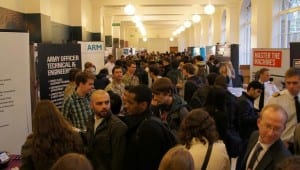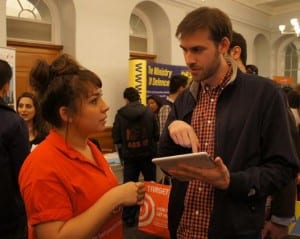Planning on attending the UCL Engineering Fair? Read this first!
By UCL Careers, on 12 October 2014
For those of you who have never been to an employer fair, you’re in for a treat: between 20-40 employers all in one place, each standing next to a glossy banner advertising their company, 45 minutes of queuing just to get in, hundreds of students pushing past you in order to ‘network’, it’s hot, stuffy, frenzied……
If this image fills your with some dread, you are not alone. However, with the right approach and a little research, the Engineering Fair (and all UCL Employer Fairs) could be a crucial step for you in helping build your career. Read on for some top tips…
- DO YOUR RESEARCH
All fairs will have a list of employers attending on the event’s website– for Engineering, it is here. Read it! And do a little research on each company to help you choose a handful of key targets to approach. Start with the basics: what do they do? What types of divisions do they have: Chemical? Mechanical? Civil? What skills and expertise are they looking for? Which areas are they expanding into? Have they won any new awards? Do they place graduates mostly on site or in the office, or a mixture of both? What about summer internships? Sandwich year placements? Go even further by finding out what makes them different from their competitor – ie. a particular project(s), sector focus or working culture.
Spefically, you want to be able to target a company that works in the area(s) that are right for you. Whether you are from Engineering, Computer Science, Physics, the Bartlett, Maths, or other – do some research on the companies attending and find out what divisions they have, or what kinds of specialisms they have, which link to your own background.
- PREPARE INTERESTING QUESTIONS
You may be thinking – what is an interesting question? First clue: not something that can be easily read on the company’s website. 
Second clue: you are talking to an actual human being, who, like you, has thoughts, opinions, a back story, and with the right prodding, can give you a world of information you could never find through desk research. So, ask the questions that will give you insight into what it really means to work at that company.
And a final clue – 9 times out of 10, graduate recruiters will jump at the chance to talk about themselves. Not only does it offer a break from having to listen to student ‘pitches’ all evening, but it allows the opportunity to really reflect on what they like/don’t like about their job, and ideally will remind them of why they are representing this company in the first place.
The key to being interesting is to be INTERESTED. There’s a person in front of you, ask them to tell you their story.
- OK, BUT WHAT SPECIFIC QUESTIONS TO ASK?
With all the above in mind, you might want to think about your questions in terms of finding out about the following:
- Details of the work, job satisfaction and motivation
- Career progression and development
- Colleagues, culture and environment
- The sector
- Routes in
- Managing the application process
- Areas of expansion of the business
- New technologies that they are promoting
Good questions could include: ‘what was your route into the sector?’; ‘what was the biggest surprise you found about working at xxx company?’; ‘looking back, what key skills do you think helped YOU to do well in this company?’
Or
‘how would you describe the typical atmosphere in the office day to day? Is it friendly/formal/informal? Are there lots of meetings?’; ‘why did you choose to work at xxx instead of the key competitors?’
Or finally
‘could you give me an idea of some of the areas that most applicants typically struggle with during the application process?’
 Quick tip: read the name badge of the employer to see which area of the business they work in. If this person is from HR, they won’t be able to give you insight into the specific role you are interested in, but they can give you insight into where candidates typically succeed/fail in the application process. If they are a ‘business line’ staff, ie. they do the kind of role that you’re aiming to get to eventually, then you should focus all your questions around gaining insight from them on how they find their day-to-day job, working in that company, etc.
Quick tip: read the name badge of the employer to see which area of the business they work in. If this person is from HR, they won’t be able to give you insight into the specific role you are interested in, but they can give you insight into where candidates typically succeed/fail in the application process. If they are a ‘business line’ staff, ie. they do the kind of role that you’re aiming to get to eventually, then you should focus all your questions around gaining insight from them on how they find their day-to-day job, working in that company, etc.
4) HELP! HOW DO I START THE CONVERSATION?
First, try to approach an employer when there are few- or no- other students hanging around that stand. This way you’ll have their undivided attention.
Introduce yourself- say your name.
Give a quick but personal summary (about 15 seconds)– for example ‘My name is xxxx, I’m currently a third year MechEng Student and have been building experience in xxxx. I’m really interested in your company (and do say the actual name of the company), specifically because of what you’ve been doing around xxxx, and was wondering if I could ask you a few questions about what it’s like to work here, and your own experience?’.
Then go for the questions!
To close, thank them for their time, ask them their name (write it down after!), and repeat your name and say you’re looking forward to applying (if you are in fact interested in them).
- TOP TIPS
-Get there early – it will be easier to keep the attention of an employer if you’re the second or third (not thirtieth) student they’ve spoken to that evening.
-Approach each employer on your own. Nothing is less appealing (or less professional) than a group of friends arriving together and taking turns asking questions.
-Dress smart. Showing that you take this event seriously will make a difference. In the words of a top recruiter, ‘first impressions count: your approach may not rule you out, but it certainly won’t rule you in’.
-please don’t just grab a bunch of freebies and walk away without saying anything to the employer.
-if you’re nervous, ‘warm up’ by approaching a few other companies not on your key target list.
-know when to move on – if there is queue forming behind you, or the employer is looking distracted, say your thank you’s, repeat your name, and move on
–WRITE DOWN NAMES of key people you talked to. You can reference these conversations with specific recruiters in your applications further on – this shows motivation, interest and that you have made an effort to learn more about the company and the sector from the inside.
-bring a few copies of your CV with you, but only give it to an employer if they ask for it
And finally, try to enjoy it! After all, at the end of the day, employers are all just people, and they are there because they really are interested in you!
Good luck!
The UCL Engineering Fair on Monday 13th October 2014 is kindly sponsored by TARGETJobs Engineering.
 Close
Close




